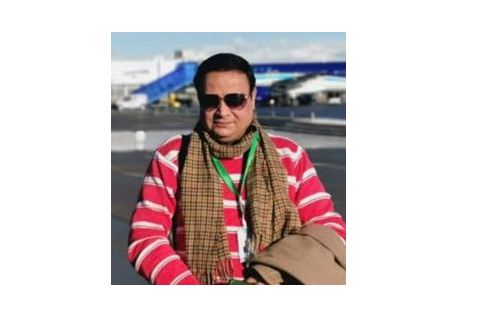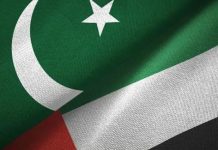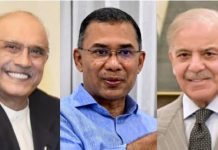Uzbekistan has been following business friendly policies since 2016 which has now drastically changed its status. Uzbekistan moved up to 69th position on the World Bank Ease of Doing business from 166th place in 2012, lowering taxes and the abundance of youthful labour should allow the country to become a powerhouse in textiles.
Dr. Mehmood Ul Hassan Khan
We live in the era of “Globalization 2” in which greater regional connectivity and socio-economic prosperity is the real essence of the humanity, prosperity, security and survival.
We are mow passing through industrial “revolution 4” during which the Republic of Uzbekistan under the visionary leadership of H.E. Shavkat Mirziyoyev has successfully started its journey of immense socio-economic prosperity, economic sustainability, political stability, regional connectivity, reconciliation, innovation, qualitative education, human capital and last but not the least, “commercial diplomacy” towards its third renaissance.
From the time “immortal” Uzbekistan has been “mesmerizing” the world from its holistic human spirits, unmatched hospitality, rich traditions, immaculate civilization, valuable and befitting propositions of intellect, knowledge, spiritualism, trade & commerce and above all unblemished bravery and human survival which played an important role in its Ist & 2nd renaissance in the past.
It has been home of “rare” human combinations like Timur, one of the greatest warriors and conquer of all time and man of literature too (Zafar Nama), and Babur the pioneer of Mughal dynasty in Sub Continent, the “inspirational” war strategist and man of books (Babur Nama), Ulugh Beg who ratified many “misconceptions” about universe, earth, planets its unlimited galaxies, Abu Rayhan al-Biruni the pioneer of “VLOG”, al-Khwarizmi the pioneer of “mathematics” and many scientific disciplines, and many prominent dignified figures have been “enlightening” the world for centuries.
Thus Uzbekistan’s Ist & 2nd renaissance was the total “sum” of superior human knowledge, wisdom, science & arts, spirits of survival, prosperity, infrastructural development, strategic expansion, statesmanship, good governance, logistic connectivity, trade & commerce, sharing & caring and last but not least, friendship, peace and harmony.
Uzbekistan’s third renaissance “comprises” of immense structural reforms, Massive Drive of Diversification of Economy (MDDE)”, “Pragmatic & Friendly Foreign Policy Module (PFPM)” and last but not least, “Holistic Model of Connectivity (HMC)” based on “shared prosperity. Its third renaissance has now been getting “momentum” and new “heights” since the start of presidency of Shavkat Mirziyoyev 2017.
According to Uzbekistan official statistics (January 2021) due to constant structural reforms the average annual investment growth rate was 22 percent during the last four years. The total volume of foreign investment reached $26.6 billion, including direct investments of $17.5 billion.
Critical analysis indicates that the total volume of investments over the past 4 years has increased by more than 2.1 times, including foreign investments by 2.7 times. The share of investment of GDP in 2019 exceeded 38 percent for the first time, which created a solid foundation for ensuring economic growth in the coming years.
At the same time, the GDP of Uzbekistan in 2019 increased by 5.6 percent. Despite the complex and complicated economic conditions and ongoing COVID-19 pandemic the World Bank has predicted the country’s GDP growth in 2021 by 4.8 percent, which is one of the best indicators among developing countries.
Moreover, Uzbekistan’s foreign trade turnover is growing much faster than GDP and in 2019 increased by 26.2 percent, amounting to $42.2 billion. While in just 9 months of 2020, despite the pandemic, the country’s foreign trade reached $27.5 billion.
Uzbekistan friendly foreign policy is achieving miracles. It has been instrumental to resolve the Afghan conflict. While addressing the United Nations General Assembly (UNGA) he proposed a new body under the UN’s auspices specifically to help Afghanistan recover from its many years in isolation and war.
Tashkent has already signed a 10 year contract to supply power to Afghanistan and Uzbek Railways are helping to re-build the Afghan rail link from Termez to Hairaton, which is one of the few transport connections Afghanistan has to the outside world.
To achieve the direct connectivity and further enhancing of trust between the state and the people, the “President’s Receptions Doctrine (PRDs)” was initiated in which common people could voice their concerns, raise issues and describe their problems directly to the government which was consequently, converted into a Ministry of Civil Services, which further led to the opening of “Single Window Operation (SWO)” that “diminished” all “bureaucratic hurdles” and provided all possible necessities of life at door steps. Even financial utilities were completely overhauled and transformed. Rights of ownership, transfer of property, SMEs registrations, facilities of micro financing were revolutionized which created unlimited miracles.
Furthermore, flexible visa regime was patronized and 2 year exit visa regime was abolished and converted into 10 year international passports, simplifying travel for Uzbek citizens. In this context, the visa regime with 100 countries was further softened and introduced 5 day visa free transit rules as well as a 30 day no visa regime to encourage tourism.
On education front, 43 universities or branches of foreign universities have opened in Uzbekistan during the last three years. The South Korean Inha University has been focusing on the IT sector and other universities are moving in. The budgetary allocations to education, housing, drinking water and strategic development goals have been further increased.
The banking sector has now been further structured and developed. A comprehensive Banking Sector Reform Road Map (BSRRM) was adopted with a concrete road map, containing definite steps that are the distinct responsibility of named individuals.
Uzbekistan has 31 banks, 13 of which have state participation. According to the Road Map, the state will only retain four major banks and all the others will be fully privatized. A massive transformation process has already been started with the assistance of International Financial Corporation (IFC), European Bank for Reconstruction and Development (EBRD), Asian Development Bank (ADB), the Big Four international consultancies and others.
Banking system assets to GDP currently stand at 52.1 percent and domestic loans to GDP at 40.4 percent. Formation of Credit Bureaus (CBs) is the need of the hour. A Domestic Debt Market (DDM) should be established. A corporate governance institute should be created to certify independent directors.
Presence and participation of foreign banks is on the rise in Uzbekistan. Two foreign banks TBC bank of Georgia and Halyk Bank of Kazakhstan have already operationalized in the domestic banking industry of Uzbekistan. Bank Anor the icon of digitalization has also received a license. Other banks, such as OTP Bank of Hungary, are also reportedly planning to open branches in Uzbekistan.
Financial market has already been transformed. Full convertibility for of national currency, the SOM has been allowed and in 2019 all profit repatriation restrictions have been removed. Tashkent Stock Exchange (TSE) has been further financial consolidated. New IPOs have brightened the chances of privatization in Uzbekistan.
Uzbekistan has obtained an international credit rating of BB and successfully issued $1bn Eurobonds with tenors of 5 and 10 years, which were followed up by a $300mn bond issue by a leading Uzbek bank SQB last year. Even Navoi Mining the largest gold and uranium producer and Uzbek Hydro Power have also announced their plans to issue international bonds.
Uzbekistan has already started its journey towards further economic liberalization, privatization, service orientation, digitalization and investments. In Uzbekistan there are approximately 3,000 state owned companies which hold more than 55 percent of the macro-economy. The government plans to decrease its stakes massively in companies by 81 percent by encouraging private sector in the country. Banks, telecoms companies, transport, insurance companies and beverages companies will be privatized very soon. The state agency “UzAssets” Company has been set up to manage the process of privatization.
Uzbekistan has introduced progressive tax regime, which has further reduced the number of taxes from 13 to 9, as well as introducing deferment and tax payments in installments. A new VAT excess return process has been introduced. The corporate tax rate has been reduced up to 15 percent.
Agriculture has been the cornerstone of the Uzbek economy since ancient times. New befitting propositions, policies and plans have been announced and implemented which has revolutionized its overall contribution to GDP. Shifting from raw commodities to export of finished goods is a “paradigm shift” in Uzbekistan. Moreover new cashable corps have further enhanced its “yield production” and of course “profitability”.
Uzbekistan has been following business friendly policies since 2016 which has now drastically changed its status. Uzbekistan moved up to 69th position on the World Bank Ease of Doing business from 166th place in 2012, lowering taxes and the abundance of youthful labour should allow the country to become a powerhouse in textiles.
Energy sector is the “cornerstone” of Uzbekistan massive drive of green industrialization. Investments in energy sector have been on the rise. A new petrochemical project has been started in the Jizzakh Oil complex in 2020. The Surhan Gas complex project has also been started.
Being prominent regional expert of Uzbekistan & CIS I predict a politically stable, economically sustainable, socially articulated, regionally connected, geopolitically secured and geo-strategically powered-house Uzbekistan in the days to come. Various reports of IMF, WB, ADB and many other international regulatory bodies have already labeled Uzbekistan, the emerging economy which is now progressing at a fast pace.
Uzbekistan’s President H.E. Shavkat Mirziyoyev has rightly noted that Uzbekistan is on the “threshold” of a new era the “Third Renaissance”. He termed independence a decisive factor in the socio-economic prosperity of the country. Economic independence, self-reliance, optimal utilization of domestic human capital, resources, provision of basic human rights, protection of constitution, civil liberties, further politicization and democratization, women empowerment, nurturing of qualitative human capital, business & investment friendly policies, conflict resolution through diplomacy, dialogue and development has further “brightened” future of Uzbekistan which is the “jewel” of Central Asia. To conclude, NEW UZBEKISTAN has now been internationally recognized, projected and patronized. Thus Uzbekistan is now on the threshold of its third renaissance.

















